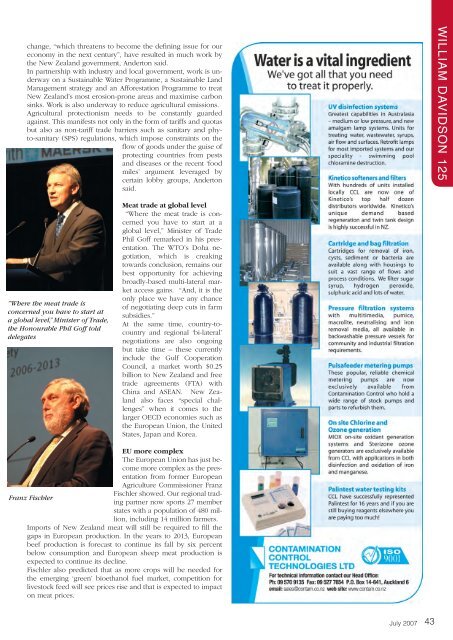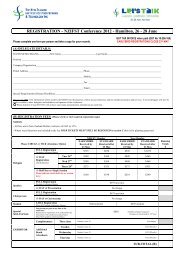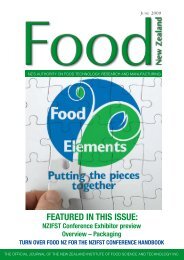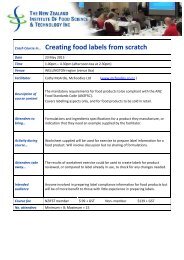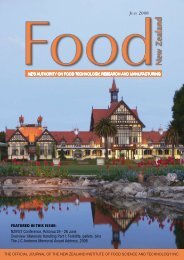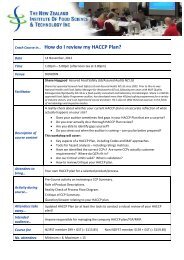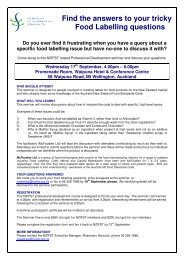William Davidson 125William Davidson125, Part IIOn the 24th May, 125 years ago, the SSDunedin docked in London. It was the end<strong>of</strong> an historic journey – 98 days long – that isstill creating waves on <strong>New</strong> <strong>Zealand</strong>’s exportlandscape. <strong>The</strong> ship was carrying 5000 frozensheep meat carcasses, the first such cargoever to reach England. <strong>The</strong> William Davidson125 conference, held in Wellington at the end<strong>of</strong> May, commemorated that journey.Changing consumer demand, increased competition from lowproduction-costcountries, climate change and global agriculturalprotectionism are four <strong>of</strong> the more important challengesahead for <strong>New</strong> <strong>Zealand</strong>, according to William Davidson 125keynote speaker, Minister <strong>of</strong> Agriculture, the Honourable JimAnderton.Shaping <strong>New</strong> <strong>Zealand</strong>’s future is in <strong>New</strong> <strong>Zealand</strong>’s hands, hesaid. His opening comments referred to William Soltau Davidson’spioneering refrigerated shipment <strong>of</strong> <strong>New</strong> <strong>Zealand</strong> meat125 years ago that “changed <strong>New</strong> <strong>Zealand</strong>’s destiny” – the legacy<strong>of</strong> a previously ‘unsung hero’.<strong>New</strong> <strong>Zealand</strong> remains an agricultural nation and will be forthe foreseeable future. Primary production and associated processesand services contribute about 17 percent <strong>of</strong> GDP andtwo-thirds <strong>of</strong> total merchandise exports. <strong>New</strong> <strong>Zealand</strong> is theworld’s largest sheep meat exporter. <strong>The</strong> meat industry alonecontributes $5 billion in export earnings annually and accountsfor 14 percent <strong>of</strong> merchandise exports.Major meat exporters leading international players“Our major meat exporters are leading international playersin their fields. A handful <strong>of</strong> our primary industry companies,all producer-owned co-operatives – PPCS/Richmond, Alliance,Fonterra, Westland and Tatua – have total capitalisation equal tothe whole <strong>of</strong> the <strong>New</strong> <strong>Zealand</strong> share market,” he said, addingthat <strong>New</strong> <strong>Zealand</strong> farms are also substantial businesses in theirown right.“Yet, the scale <strong>of</strong> our industry is puny, compared to the internationalbusinesses <strong>of</strong> other developed countries.”Highlighting the opportunities available to <strong>New</strong> <strong>Zealand</strong> companieson the world stage, Anderton compared Fonterra, <strong>New</strong><strong>Zealand</strong>’s largest food company, to German company Siemens,which started exporting to the UK in 1865 – about the sametime as Davidson’s first frozen meat shipments. Siemens is nowEurope’s largest engineering firm with revenue <strong>of</strong> NZ$170 billion– far beyond <strong>New</strong> <strong>Zealand</strong>’s GDP. Eighty percent <strong>of</strong> itssales, three-quarters <strong>of</strong> its factories and two-thirds <strong>of</strong> its workforce<strong>of</strong> nearly half a million people are outside its Germanhomeland.Minister <strong>of</strong> Agriculture, the Honourable Jim Anderton,underlined the importance <strong>of</strong> primary production to ournation’s economy<strong>The</strong> increasing sophistication <strong>of</strong> <strong>New</strong> <strong>Zealand</strong>’s exports and thevalue locked up in its science and knowledge are all preparingour primary industries for the future. “But we enter thatfuture knowing there are enormous opportunities….(and also)challenges we have to face…: Changing consumer demand,increased competition from low-cost countries, climate changeand global agricultural protectionism.”Increased competition leads to more intensive production methods,while global concerns about the environment and climate42Food <strong>New</strong> <strong>Zealand</strong>
change, “which threatens to become the defining issue for oureconomy in the next century”, have resulted in much work bythe <strong>New</strong> <strong>Zealand</strong> government, Anderton said.In partnership with industry and local government, work is underwayon a Sustainable Water Programme, a Sustainable LandManagement strategy and an Afforestation Programme to treat<strong>New</strong> <strong>Zealand</strong>’s most erosion-prone areas and maximise carbonsinks. Work is also underway to reduce agricultural emissions.Agricultural protectionism needs to be constantly guardedagainst. This manifests not only in the form <strong>of</strong> tariffs and quotasbut also as non-tariff trade barriers such as sanitary and phyto-sanitary(SPS) regulations, which impose constraints on theflow <strong>of</strong> goods under the guise <strong>of</strong>protecting countries from pestsand diseases or the recent ‘foodmiles’ argument leveraged bycertain lobby groups, Andertonsaid.William Davidson 125”Where the meat trade isconcerned you have to start ata global level,” Minister <strong>of</strong> Trade,the Honourable Phil G<strong>of</strong>f tolddelegatesMeat trade at global level“Where the meat trade is concernedyou have to start at aglobal level,” Minister <strong>of</strong> TradePhil G<strong>of</strong>f remarked in his presentation.<strong>The</strong> WTO’s Doha negotiation,which is creakingtowards conclusion, remains ourbest opportunity for achievingbroadly-based multi-lateral marketaccess gains. “And, it is theonly place we have any chance<strong>of</strong> negotiating deep cuts in farmsubsidies.”At the same time, country-tocountryand regional ‘bi-lateral’negotiations are also ongoingbut take time – these currentlyinclude the Gulf CooperationCouncil, a market worth $0.25billion to <strong>New</strong> <strong>Zealand</strong> and freetrade agreements (FTA) withChina and ASEAN. <strong>New</strong> <strong>Zealand</strong>also faces “special challenges”when it comes to thelarger OECD economies such asthe European Union, the UnitedStates, Japan and Korea.EU more complex<strong>The</strong> European Union has just becomemore complex as the presentationfrom former EuropeanAgriculture Commissioner FranzFischler showed. Our regional tradingpartner now sports 27 memberFranz Fischlerstates with a population <strong>of</strong> 480 million,including 14 million farmers.Imports <strong>of</strong> <strong>New</strong> <strong>Zealand</strong> meat will still be required to fill thegaps in European production. In the years to 2013, Europeanbeef production is forecast to continue its fall by six percentbelow consumption and European sheep meat production isexpected to continue its decline.Fischler also predicted that as more crops will be needed forthe emerging ‘green’ bioethanol fuel market, competition forlivestock feed will see prices rise and that is expected to impacton meat prices.July 200743


